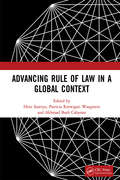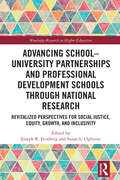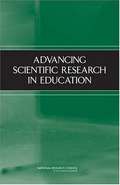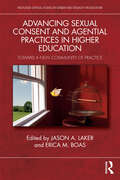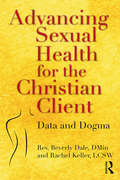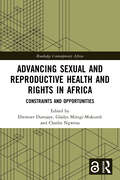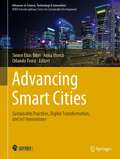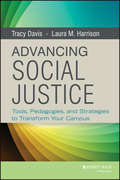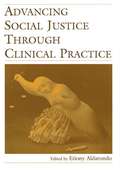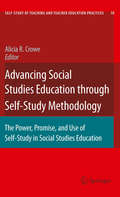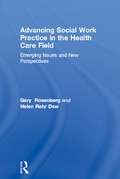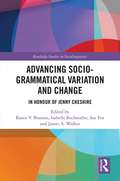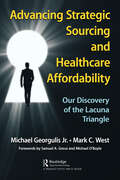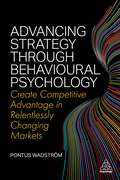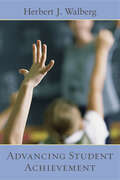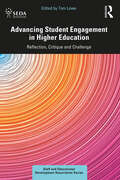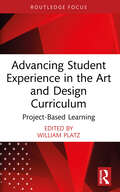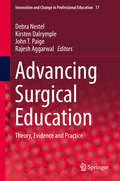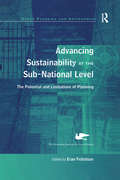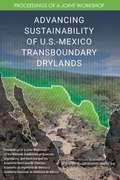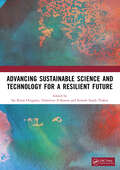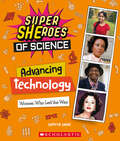- Table View
- List View
Advancing Rule of Law in a Global Context: Proceedings of the International Conference on Law and Governance in a Global Context (icLave 2017), November 1-2, 2017, Depok, Indonesia
by Heru Susetyo Patricia Rinwigati Waagstein Akhmad Budi CahyonoThe papers published in this proceedings volume are written by a selection of authors, resulting from a call for papers for the 1st International Conference on Law and Governance in a Global Context (ICLAVE) originating from Indonesia and other countries. This proceedings volume shall be a very valuable contribution to understand contemporary law issues in Indonesia which are not always taught in law schools. These proceedings will not only serve as a useful reference for law students and academicians, but also help law practitioners to understand law issues that may be encountered in Indonesia. It covers selected items such as Administrative Law, Constitutional Law, Business Law, Intellectual Property Law, Criminal Law, Human Rights Law, Adat Law, Shariah Law, Judiciary Law and International Law, which are all important for undergraduate and post-graduate law students, as well as academicians and law practitioners in the law community.
Advancing School-University Partnerships and Professional Development Schools through National Research: Revitalized Perspectives for Social Justice, Equity, Growth and Inclusivity (Routledge Research in Higher Education)
by Joseph R. Feinberg Susan L. OgletreeThis book offers a comprehensive guide to the impact of professional development schools and school–university partnerships (PDSs-SUPs), articulating both the major issues that confront PDSs-SUPs and the various research methods shaping the field.Stemming from a national PDS research conference and project funded by the American Educational Research Association, this collaborative effort presents a vision aimed at promoting inclusive, equity-focused research within PDSs-SUPs and delves into the insights of researchers as they examine revitalized perspectives, persistent challenges, and emerging areas of study.This volume will appeal to scholars, teachers, teacher educators, university students, and education policymakers with interest in social justice in research, teacher education, and P-12 partnerships.
Advancing Scientific Research In Education
by National Research Council of the National AcademiesTransforming education into an evidence-based field depends in no small part on a strong base of scientific knowledge to inform educational policy and practice. Advancing Scientific Research in Education makes select recommendations for strengthening scientific education research and targets federal agencies, professional associations, and universities—particularly schools of education—to take the lead in advancing the field.
Advancing Sexual Consent and Agential Practices in Higher Education: Toward a New Community of Practice (ISSN)
by Jason A. Laker Erica M. BoasThis book provides an in-depth exploration of sexual consent communication and negotiation practices among students and efforts to prevent and respond to sexual coercion and violence within the context of North American higher education institutions.Delving into the complexities of communication around sexual consent, it examines how factors such as identity, early learning experiences, societal norms, and coercive elements influence interactions among young adult postsecondary students. It emphasizes the importance of agency in intimate settings and how this is shaped by these factors. The methodology employed in this decade-long research is innovative and interview-based, providing a rich narrative from student perspectives. These narratives serve to highlight the intricate interplay between individual agency and societal expectations in intimate situations. The book also incorporates valuable insights from other experts in the field. These contributions serve to contextualize the study’s findings within the broader theoretical framework and research on the subject. This approach not only enriches the descriptions of the study but also provides a more holistic understanding of the topic. As such, the book ultimately helps to inform educational policies and professional practices to promote sexual agency and address pressing issues such as sexual coercion, violence, and assault on campus.This volume will appeal to researchers and stakeholders in higher education, including educators, upper-level students, professional practitioners, and parents. In doing so, it contributes to the conversation around creating a safer and more respectful environment in higher education institutions.
Advancing Sexual Health for the Christian Client: Data and Dogma
by Beverly Dale Rachel KellerAdvancing Sexual Health for the Christian Client is an essential toolkit for professionals working at the intersection of Christian belief and sexual health. In this book, Beverly Dale and Rachel Keller deconstruct potentially harmful Christian beliefs around sexuality to support clients stuck in sexual guilt, shame and fear. Combining the experience of an ordained Christian clergy with a certified sexologist, this guide promotes a new approach to sex and faith for therapists, which will help their clients to reconcile a belief in God’s love with sexual knowledge and fulfilment. Grounded in historical and cultural contexts, and drawing from both academic research and scriptural exegesis, the authors offer practical clinical applications and interventions to enable clients to re-examine their sexual beliefs in a way that encourages sexual healing. By understanding the goals of a sex-positive, body-positive Christianity, professionals can find a common language with the person of faith and build an effective therapeutic relationship. This book will be a key point of reference for any sex therapist, educator, or student looking to integrate faith-based concepts into their approach.
Advancing Sexual and Reproductive Health and Rights in Africa: Constraints and Opportunities (ISSN)
by Ebenezer Durojaye Gladys Mirugi-Mukundi Charles NgwenaThis book explores recent developments, constraints and opportunities relating to the advancement of sexual and reproductive health and rights in Africa.Despite many positive developments in relation to sexual and reproductive health in recent years, many Africans still encounter challenges, for instance in poor maternity services, living with HIV, and discrimination on the basis of age, gender, sexual orientation or identity. Covering topics such as abortion, gender identity, adolescent sexuality and homosexuality, the chapters in this book discuss the impact of culture, morality and social beliefs on the enjoyment of sexual and reproductive health and rights across the continent, particularly in relation to vulnerable and marginalized groups. The book also explores the role of litigation, national human rights institutions and regional human rights bodies in advancing the realization of sexual and reproductive health and rights in the region. Throughout, the contributions highlight the relevance of a rights-based framework in addressing topical and contentious issues on sexual and reproductive health and rights within Sub-Saharan Africa.This book will be of interest to researchers of sexuality, civil rights and health in Africa.The Open Access version of this book, available at http://www.taylorfrancis.com/books/e/9781003175049, has been made available under a Creative Commons Attribution-Non Commercial-No Derivatives 4.0 license.
Advancing Sexual and Reproductive Health and Rights in Africa: Constraints and Opportunities (Routledge Contemporary Africa)
by Ebenezer Durojaye, Gladys Mirugi-Mukundi and Charles NgwenaThis book explores recent developments, constraints and opportunities relating to the advancement of sexual and reproductive health and rights in Africa. Despite many positive developments in relation to sexual and reproductive health in recent years, many Africans still encounter challenges, for instance in poor maternity services, living with HIV, and discrimination on the basis of age, gender, sexual orientation or identity. Covering topics such as abortion, gender identity, adolescent sexuality and homosexuality, the chapters in this book discuss the impact of culture, morality and social beliefs on the enjoyment of sexual and reproductive health and rights across the continent, particularly in relation to vulnerable and marginalized groups. The book also explores the role of litigation, national human rights institutions and regional human rights bodies in advancing the realization of sexual and reproductive health and rights in the region. Throughout, the contributions highlight the relevance of a rights-based framework in addressing topical and contentious issues on sexual and reproductive health and rights within Sub-Saharan Africa. This book will be of interest to researchers of sexuality, civil rights and health in Africa.
Advancing Smart Cities: Sustainable Practices, Digital Transformation, and IoT Innovations (Advances in Science, Technology & Innovation)
by Simon Elias Bibri Anna Visvizi Orlando TroisiThis book presents a comprehensive exploration of the transformative journey toward smart cities and the implementation of cutting-edge technologies in urban development. Divided into four distinct parts, it covers a broad range of topics that contribute to sustainable, efficient, and innovative urban living. Encompassing diverse research from IEREK's Future Smart Cities (FSC) conference, it focuses on smart city advancement through sustainable practices, digital transformation, and IoT integration. Covering topics such as smart buildings, urban planning during pandemics, and IoT applications in health care and agriculture, this book shapes the future of urban living. It delves further into opportunities in city regeneration, human-centric smart design, IoT data effectiveness, and more. A valuable resource for academics, researchers, and policymakers, it offers insights into telecommunications, AI, smart manufacturing, and methodologies for urban ecosystem improvement.
Advancing Social Justice
by Laura M. Harrison Tracy DavisThis groundbreaking book offers educators a clear understanding of the concept of social justice and includes effective practices to help them promote social justice and address identity development on their campuses. In the first half of the book, the authors clarify the definition of social justice as an approach that examines and acknowledges the institutional and historical systems of power and privilege on individual identity and relationships. They provide important frameworks and foundational aspects of understanding social justice, and several chapters explore identity development using the critical lenses of history and context, concentrating on ways that oppression and privilege are manifest in the lived experiences of students. In the second half of the book, the authors supply educators with the conceptual tools and strategies needed to infuse a social justice approach into their work with students and within their institutions. They highlight important concepts to consider in designing and implementing effective social justice interventions and provide examples of effective social justice programs.
Advancing Social Justice Through Clinical Practice
by Etiony AldarondoThere is a healthy development in the human service professions these days. At community clinics, private practices, and universities around the country mental health professionals and service providers are working with increased awareness of the toxic effects of social inequities in the lives of people they aim to help. Quietly, by acting out thei
Advancing Social Studies Education through Self-Study Methodology: The Power, Promise, and Use of Self-Study in Social Studies Education (Self-Study of Teaching and Teacher Education Practices #10)
by Alicia R. CroweAdvancing Social Studies Education through Self-Study Methodology provides a collection of works that highlights ways in which self-study of teaching and teacher education practices can advance conversations and knowledge in social studies education. Some of the pieces chosen for this book will provide theoretical connections between the two fields (e.g. how values and principles important to both fields work together, are similar, and can help each field expand). Others will provide specific examples of self-studies that focus on social studies specific concepts. The book provides a strong and clear introduction of self-study to the field of social studies education as well as an argument for its use to further understand social studies teaching and teacher education. It also provides the self-study community with an example of how self-study can be used to look at content specific aspects of teaching and teacher education.
Advancing Social Work Practice in the Health Care Field: Emerging Issues and New Perspectives
by Gary Rosenberg Helen Rehr, DswCommemorating the 75th anniversary of the Department of Social Work at the Mount Sinai Medical Center in New York City, this innovative and exciting book traces the growth of the social work mission and the development of vanguard social work programs at Mount Sinai. Leading social work educators and practitioners look at where the profession is today and speculate on where it might be going. Each article is new and original to this book, and each contributor is a distinguished representative from his specialty in the field. Advancing Social Work Practice in the Health Care Field, with its wealth of historical, practical, and theoretical information, reflects today’s state of the art in selected areas and should serve as an information source not only for practitioners and administrators, but also for educators who are committed to enhancing the social work services and the quality of social health care.
Advancing Socio-grammatical Variation and Change: In Honour of Jenny Cheshire (Routledge Studies in Sociolinguistics)
by Sue Fox Isabelle Buchstaller James A. Walker Karen V. BeamanThis groundbreaking collection showcases Jenny Cheshire’s influential work in bringing greater attention to quantitative analysis of socio-grammatical variation and builds upon her contributions with new lines of inquiry pushing sociolinguistic research forward. Featuring contributions from leading experts in the field, the volume is structured in six parts with a particular focus on syntactic, morpho-syntactic, and discourse-pragmatic variation and change, each section turning a lens on a different aspect of socio-grammatical variation. The first sections of the volume focus on the role of structure, its relevance for sociolinguistic production and perception and the impact of social structure on formal structure. Two sections look at the interface of variationist research with other aspects of linguistic research, including generative syntax and discourse-pragmatic features. The final sections consider the importance of integrating broader external factors in socio-grammatical variation, exploring the impact of interactional pressures in the sociolinguistic environment and the role of multi-ethnic contact varieties. Taken together, this volume demonstrates the critical role of socio-grammatical variation in our understanding of language change as a holistic process.
Advancing Sports and Exercise via Innovation: Proceedings of the 9th Asian South Pacific Association of Sport Psychology International Congress (ASPASP) 2022, Kuching, Malaysia (Lecture Notes in Bioengineering)
by Tony Morris Rabiu Muazu Musa Anwar P. P. Abdul Majeed Garry Kuan Yu-Kai Chang Teo Eng WahThis book presents the proceedings of the 9th Asian South Pacific Association of Sport Psychology International Congress (ASPASP) 2022, Kuching, Malaysia, which entails the different sporting innovation themes, namely, Applied Sport and Social Psychology, Health and Exercise, Motor Control and Learning, Counselling and Clinical Psychology, Biomechanics, Data Mining and Machine Learning in Sports amongst others. It presents the state-of-the-art technological advancements towards the aforesaid themes and provides a platform to shape the future direction of sport science, specifically in the field sports and exercise psychology.
Advancing Strategic Science: A Spatial Data Infrastructure Roadmap for the U.S. Geological Survey
by Committee on Spatial Data Enabling USG Strategic Science in the 21st CenturyScience is increasingly driven by data, and spatial data underpin the science directions laid out in the 2007 U. S. Geological Survey (USGS) Science Strategy. A robust framework of spatial data, metadata, tools, and a user community that is interactively connected to use spatial data in an efficient and flexible way--known as a spatial data infrastructure (SDI)--must be available for scientists and managers to find, use, and share spatial data both within and beyond the USGS. Over the last decade, the USGS has conducted breakthrough research that has overcome some of the challenges associated with implementing a large SDI. Advancing Strategic Science: A Spatial Data Infrastructure Roadmap for the U. S. Geological Survey is intended to ground those efforts by providing a practical roadmap to full implementation of an SDI to enable the USGS to conduct strategic science.
Advancing Strategic Sourcing and Healthcare Affordability: Our Discovery of the Lacuna Triangle
by Mark C. West Michael Georgulis, Jr.The United States spends more than 17% of its gross domestic product (GDP) on health care, while other developed countries throughout the world average 8.7% of GDP on healthcare expenditures. By 2028, that percentage in the United States is projected to be 19.7% of GDP. Yet all this spending apparently doesn’t equate to value, quality, or performance. Among 11 high-income countries, the U.S. healthcare industry ranked last during the past seven years in four key performance categories: administrative efficiency, access to care, equity, and healthcare outcomes. This book centers on ways to bring down skyrocketing healthcare costs and improve comparatively low patient outcomes by focusing on the second-highest cost after staffing in U.S. healthcare: the supply chain. The authors present strategies for aligning the healthcare supply chain, leadership, physicians, and department budget owners to achieve evidence-based value analysis (EVA) and effective strategic sourcing. The key to bringing alignment to where it needs to be is understanding the art and science of EVA and strategic sourcing and reorienting the health systems toward productively and gainfully accomplishing them both. Within healthcare, the biggest opportunities for a quantum leap in affordability and quality directly tie to improving the product and service selection process through EVA and greatly advancing hospital and health system supply chain sourcing strategies. The book outlines what the authors call the Lacuna Triangle—three lacunas (or gaps) that occur in hospitals and health systems that prevent them from pursuing effective EVA and strategic sourcing. The authors explore the three effects of those gaps, which keep the Lacuna Triangle walls tightly closed so that the oligopolies, irrational markets, and irrational pricing that those gaps create can continue to thrive, and where many healthcare organizations remain trapped. The goal with this book is to pluck the supply chain and health system executive and clinical leadership out of the chaos and irrationality they are caught in and give them tactics and strategies for reengineering the alignment of these processes to serve their enterprises’ needs. The book does this by a deep exploration into strategic sourcing, a way of doing business that has been embraced and employed effectively for decades in supply chain management in various industries and in healthcare supply chain in other countries.
Advancing Strategy through Behavioural Psychology: Create Competitive Advantage in Relentlessly Changing Markets
by Pontus WadströmAccelerate strategy and achieve desired results with this guide to understanding and influencing employee behaviour, based on the theory and practice of strategic management, behavioural psychology and change.The realisation of strategy is entirely dependent on employee behaviour, so in order to achieve business results it is vital that managers and leaders develop an understanding of human behaviour. Advancing Strategy through Behavioural Psychology shows that by identifying which behaviours should be measured and encouraged, organizations can succeed in implementing strategies for continuous adaptation in a rapidly changing business environment.Grounded in practitioner experience and academic research, this book argues that to achieve set goals organizations should spend less time planning and sending out instructions and more time on providing feedback on implementation and drawing out key points to be learned. By focusing on behaviour in this way, organizations can create a culture where innovation is encouraged and employees want to contribute to the company's future. Ensure long-term success and seize competitive advantage with this essential guide to identifying the key behaviours which will create business results and what influences them.
Advancing Student Achievement
by Herbert J. WalbergA renowned educator-psychologist explains how children learn and how family, classroom, and school practices can help them learn more effectively. In addition to drawing on studies of learning outcomes, the author reveals economic research on teacher education and school choice that challenges many popular assumptions.
Advancing Student Engagement in Higher Education: Reflection, Critique and Challenge (SEDA Series)
by Tom LoweProviding a selection of critical pieces on the key challenges and debates in student engagement in higher education, this edited collection of sector-leading, scholarly-informed critical reflections is designed to consider and build upon what can be done to advance student engagement. By problematising student engagement practice, this book explores how to strengthen policies, recognise the issues and create solutions to overcome barriers and tensions. It considers topics such as diversity, accessibility, representativeness, evidencing impact, data analytics, the campus estate and the impact of COVID-19. The contributors provide lessons learned and knowledge from the field to make practice with students more considered and robust for the challenges ahead in the post-pandemic university. Moving beyond endorsing student engagement and offering best practice to critically reflect on and challenge our engagements with students in contemporary higher education, this book is ideal reading for all those developing education, course leaders and heads of academic departments, as well as anyone interested in advancing student engagement in their higher education setting.
Advancing Student Experience in the Art and Design Curriculum: Project-Based Learning (Routledge Focus on Design Pedagogy)
by William PlatzAdvancing Student Experience in the Art and Design Curriculum: Project-Based Learning will renew the critical attention paid to projects in the art and design curriculum and rigorously consider impacts on student experience.How exactly do we conceive of ‘projects’ in the context of a post-secondary creative arts curriculum? Each chapter in this book confronts the project as a specific, potent and transformative site of learning with vast engagement potential for the contemporary student. What unites the project-based learning methods in this book is an emphasis on the motivated and purposeful activities of the learners that result in tangible making and doing. Craft-based learning, practice-based learning, experimental learning design, culturally informed practices and reconsideration of obsolete learning mechanisms all coalesce in this text and evidence the innovativeness and abiding power of project-based learning.Each author in this book describes a diverse experience of learning that serves as an exemplar of project-based learning and illuminates the histories, theories and dynamics of the method for teachers, learning designers, educational theorists and interdisciplinarians.
Advancing Surgical Education: Theory, Evidence and Practice (Innovation and Change in Professional Education #17)
by Debra Nestel Kirsten Dalrymple John T. Paige Rajesh AggarwalThis book is designed for anyone involved in surgical education. While it is intended as a core reference for surgeons who want to develop their surgical education knowledge and practice, it also a valuable resource for anyone undertaking a higher degree in health professions education. Divided into five parts, it starts with chapters on foundational knowledge, exploring the past before documenting the current state of surgical education and highlighting various educational leadership and governance topics. The second part examines a range of theories that inform surgical education – cognitive, behavioural and social, while the third part offers practical guidance on elements of surgical education – curriculum design, selection, feedback, assessment, evaluation, simulation and managing trainee underperformance. It also includes chapters on supporting the development of psychomotor skills, operative skills in theatre, professionalism, teamwork and patient safety. The next part shifts the focus to research in surgical education, introducing readers to all phases of conducting education research based on qualitative, quantitative and mixed methods paradigms. The final part looks to the future of surgical education and of surgical educators. Assembling these topics in one volume makes this book invaluable to anyone involved in surgical education.
Advancing Sustainability at the Sub-National Level: The Potential and Limitations of Planning (Urban Planning and Environment)
by Eran FeitelsonSustainability notions have been widely embraced by planners. However, the question of what can planners contribute to the advancement of such notions has not received much attention until now. This volume examines the potential contribution of planning to the advancement of sustainability at sub-national level, and the limitations it faces in doing so. Bringing together case studies from the US, UK, Poland, Israel, South Africa, The Netherlands and Italy, it covers a wide range of issues and contexts, ranging from the metropolitan to the community level. On the basis of these case studies, the book shows that planners do indeed have a variety of options to advance sustainability notions at these levels, and appear to be doing so. The book proposes that planners should operate at two levels: firstly to change institutional structures, and secondly to advance sustainability notions incrementally in the meantime, within the existing institutional constraints.
Advancing Sustainability of U.S.-Mexico Transboundary Drylands: Proceedings Of A Workshop
by Engineering Medicine National Academies of SciencesThe drylands region shared by the United States and Mexico currently faces multiple sustainability challenges at the intersection of the human and natural systems. Warming and drying conditions threaten surface water and groundwater availability, disrupt land- and marine-based livelihood systems, and challenge the sustainability of human settlements. These biophysical challenges are exacerbated by a highly mobile and dynamic population, volatile economic and policy conditions, increased exposure to extreme events, and urbanization on marginal, vulnerable lands. The U.S. National Academies of Sciences, Engineering, and Medicine collaborated with the Mexican Academy of Sciences, Academy of Engineering, and the National Academy of Medicine to plan a 2-day binational workshop, Advancing Sustainability of U.S.-Mexico Transboundary Drylands. The workshop goals were to highlight the challenges facing the region, assess the scientific and technical capacity that each nation can bring to bear in addressing these challenges, and identify new opportunities for binational research collaboration and coordinated management approaches in the advancement of sustainability science and development. This publication summarizes the presentations and discussions from the workshop.
Advancing Sustainable Science and Technology for a Resilient Future
by Dimitrios A Karras Sai Kiran Oruganti Srinesh Singh ThakurThe Industrial Internet of Things (IIoT) has become an effective tool with significant implications for industrialisation and Market Research (MR), especially in the field of green production. Green IIoT (GRIIoT) can be used to implement Green Production (GP) goals for the environment. The purpose of this study is to examine the drivers behind the adoption of GIIoT, MR, and industrialization decision-making, as well as the effects these drivers have on industrialization performance (IP). A structured questionnaire was used to gather information in order to evaluate the suggested study paradigm. The results indicate that institutional isomorphism influences the acceptance of GRIIoT in a favorable way. Furthermore, Green innovation (GI) activities that result in IP are favorably correlated with GIIoT. The potential effects of the various institutional isomorphisms discussed in this study can aid organizations in better understanding the responsibilities to protect and satisfying stakeholders, particularly as the adopt GIIoT to handle production problems and possible accordance pressures in the process.
Advancing Technology: Women Who Led the Way (Super SHEroes of Science) (Super SHEroes of Science)
by Supriya SahaiThis brand-new series highlights some of the major contributions women have made in the world of science.Did you know that the technology behind cell phones was based on an idea developed during World War II by the Hollywood star Heddy Lamar to prevent the enemy intercepting radio messages? The computer and other electronic devices have changed life dramatically over the last 70 years—and many of the key breakthroughs in technology were made by women. These women’s achievements were often highly specialized and have been widely overlooked. This book tells their stories and describes their vital contributions.
